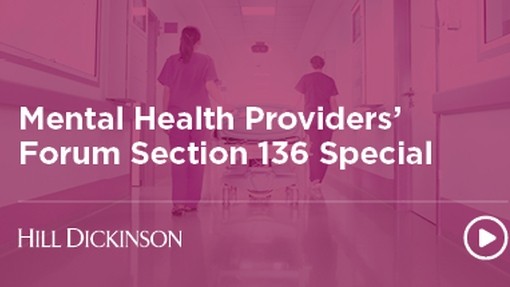Media, mental health and timeliness in statutory appeals

Media, mental health and timeliness in statutory appeals
This summer has seen a number of legal judgments involving healthcare professionals which re-articulate long-established principles at their heart, but which raise various procedural issues of which practitioners should be aware.
The case of Dr Zoe Sun v General Medical Council [2023] EWHC 1515 is one such case. The background facts are that Dr Sun was accused of misconduct in relation to research, dishonesty to her fellow researchers, false statements in a job application and false allegations of criminal proceedings for sexual harassment and slander. There were 13 charges relating to dishonesty in all. It was reported in the media with lurid headlines.
The GMC imposed a sanction of erasure, which Dr Sun appealed – and lost.
Key points to take away
- If material has been dealt with in private by a panel (generally, because they relate to the health of the practitioner), the question of reporting restrictions or anonymity on appeal should be considered sooner rather than later.
- A mental health issue on behalf of a practitioner may be relevant to a number of questions: the question of whether the conduct was dishonest at all; the level of misconduct; as a feature in current impairment; or as mitigation as to sanction. These should be considered separately.
- Extensions in time: the test remains “exceptionality”, but a combination of events such as poor health, a last-minute change in legal representation (not through the fault of the registrant) and being given erroneous legal advice – with a registrant “doing all they could” – can, on a fact specific basis, meet this test.
The appeal
Reporting restrictions
At the outset of the appeal, counsel for Dr Sun asked the court to for reporting restrictions. This application had not been foreshadowed and was made on the basis of who was sat in the public gallery that day. The application was rejected. For those representing registrants on appeal where health information has been given in private session before a panel, the question of publicity is something that should be considered and advised on at an early stage.
Role of mental health issues
A centre point of Dr Sun’s appeal was that the panel had failed to take sufficient account of her mental health issues. On appeal, this point was rejected. The Court found that the panel had been right to find that whilst Dr Sun did have mental health problems, these “did not lead her to misappreciate what she was doing”. The Court also found that the panel had been correct to take these into account as mitigation – but that the panel were then entitled to consider the weight of these as mitigation against other factors.
Extensions in time to appeal
In terms of procedural issues, the issue of timeliness of appeal arose, as it has in fitness to practise appeals over many years. The deadline for appeal was 28 April. The appeal was filed, with the fee paid, on 4 May. It was accepted that this was out of time. The case law is clear that an extension of time to appeal is only available where compelled by the standards of Article 6 (right to a fair trial).
Between the panel determination and the deadline, Dr Sun informed the court she had lost her representation from the MPS, counsel was unwell and unable to advise, and she herself was unwell following receipt of the panel decision. On 28 April, she received pro bono advice – but was mistakenly told to file in the Queens Bench Division rather than the Administrative Division. She was then further mistakenly told that it should be the Chancery Division. Dr Sun filed her appeal with the Chancery Division on the date of the deadline. Technical difficulties (and the fact it was the wrong division) means that she was unable to use the CE-filing account, and so sent the appeal papers to one of the generic Chancery Division emails she found online, at approximately 16:30 on the deadline day.
The next day, at 15:57 on Friday 29 April (just before a bank holiday weekend), the Chancery Division informed Dr Sun that she should instead have filed with the Administrative Division. She sent the papers approximately half an hour later to the Administrative Court email address and asked how to pay the fee.
The Court concluded that in the circumstances above, it would have granted the extension. The test is ‘exceptional difficulties’ and Dr Sun had provided evidence and a ‘full’ explanation. This was not a situation where Dr Sun had ‘done nothing’ until the deadline, she was instead in the hands of others. The Court did not criticise her conduct.
Next steps
Our professional disciplinary team has expertise of all stage of fitness to practise proceedings, from initial referrals and interim orders through to final hearings and appeals. If you would like to speak to us for advice and representation, please get in contact.






